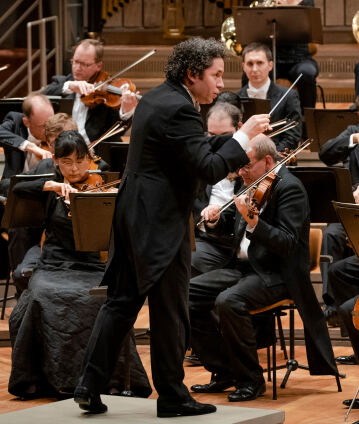Gustavo Dudamel conducts Mahler’s Fifth Symphony

Gustav Mahler described his Fifth Symphony as a “cursed work” that “no-one understands”. While the extreme variety of expression actually overwhelmed the audience at the time, the symphony enjoys the highest popularity today, especially thanks to its gossamer-like Adagietto movement. Gustavo Dudamel, music director of the Los Angeles Philharmonic, also conducts Leonard Bernstein’s cheeky occasional piece, Divertimento, which – here in Europe at least – is far too rarely heard.
His life reads like a novel: born into a 50-square-metre household where seven people lived, Gustavo Dudamel joined the Venezuelan music project “El Sistema” when he was 4 years old. At the age of eleven, he received violin lessons, and one year later he tried out the conductor’s desk for the first time. In 1999, Dudamel finally took over the direction of the National Youth Symphony Orchestra “Simón Bolívar” under whose founder, José Antonio Abreu, he continued his conducting studies. Abreu provided his protégé with music and philosophy books and brought him ballet videos with Rudolf Nureyev – but also called at six in the morning to discuss Shostakovich with him. He once handed Dudamel a score of Mahlerʼs First Symphony: “A few hours later he said: sing the first movement!” In 2004, the charismatic Venezuelan, who is one of today’s foremost conductors, gained international attention following his success at the Gustav Mahler conducting competition in Bamberg. From 2007 to 2012 he was chief conductor of the Gothenburg Symphony Orchestra, and since the 2009/10 season, he has been music director of the Los Angeles Philharmonic.
For this year’s guest appearance with the Berliner Philharmoniker, Gustavo Dudamel dedicates himself to Gustav Mahler, a transitional composer whose music absorbed both the last flourishings of the great Romantic tradition and the beginnings of a new epoch: probably no one else better formulated the brokenness of the end of the 19th and the beginning of the 20th century. In his symphonies, Mahler was able to capture the splendour of the past just as magnificently as the pain of its loss. On the programme is Mahlerʼs Fifth, whose fanfare opening already distinctively features those military idioms that were familiar to the composer from his early youth with their marches, signals and percussive, drumming salutes.
A very different tone is set by the first work of these evenings, written by Leonard Bernstein who, as a conductor, made a significant contribution to the Mahler renaissance which began in the 1960s. His Divertimento for Orchestra commemorates the 100th anniversary of the Boston Symphony Orchestra and is accordingly lively, sometimes contemplative but on the whole amusing and full of variety: music that starts with celebratory rather than military fanfares and presents dance types over its nine movements such as the samba, turkey trot and blues before culminating in a grand, final apotheosis: “The BSO Forever”.
© 2018 Berlin Phil Media GmbH
Artists
Our recommendations
- Gustavo Dudamel conducts Beethoven, Schubert and Stravinsky
- Gustavo Dudamel conducts Wagner and Schumann at the Waldbühne
- Gustavo Dudamel conducts Mahler’s Second Symphony
- Gustavo Dudamel conducts Tchaikovsky’s Fifth
- Gustavo Dudamel with Mahler’s Fifth Symphony
- Europakonzert 2012 from Vienna with Gustavo Dudamel and Gautier Capuçon